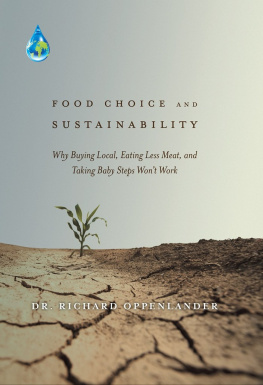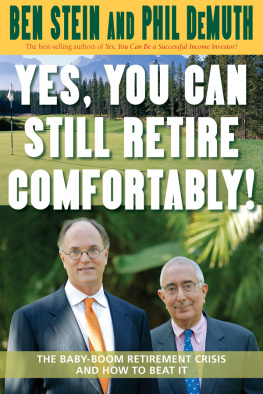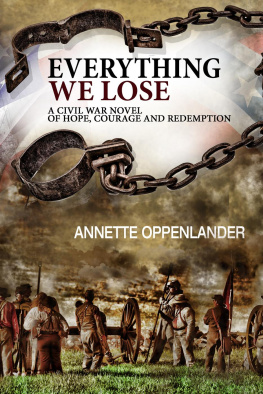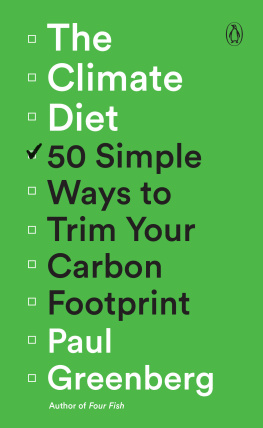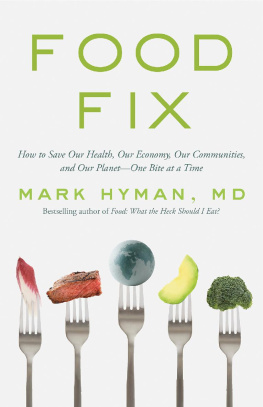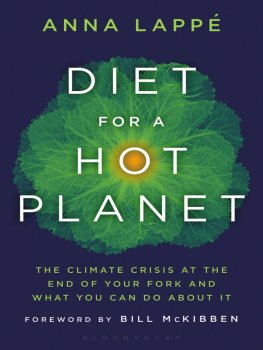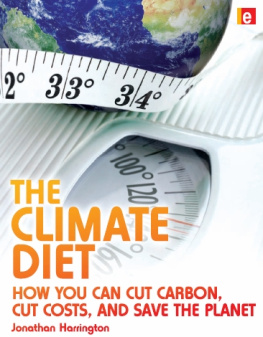If you care about our planet, and want to make a difference, this book is a must-read.
Ellen DeGeneress BOOKS ELLEN READS
Comfortably Unaware explains, so clearly, how what we choose to eat has a direct impact on the health of Planet Earth: how modern agro-business and our thoughtless appetites are, quite literally, destroying the environment and the future of our children. I urge you to read it, to think about its message, discuss it with your friends and start to change the world, one bite, one meal, one diet at a time.
Jane Goodall, PhD, DBE, UN Messenger of Peace
As vegan diets gain popularity across the country for a way to improve health and the welfare of animals, its no secret that the environmental effects of this diet can have a positive effect on our planet. Comfortably Unaware helps readers take a closer look at just this how to heal the planet by changing whats on your plate. A health and environmental advocate for over 30 years, Dr. Oppenlander has long been inspiring change with his informative message. May his message inspire you.
Neal Barnard, President, Physicians Committee for Responsible Medicine
COMFORTABLY UNAWARE
COMFORTABLY UNAWARE
What we choose to eat is killing us and our planet
DR. RICHARD A. OPPENLANDER

Copyright 2012 by Dr. Richard A. Oppenlander
Beaufort Books
27 West 20th Street, Suite 1102
New York, New York 10011
(212) 727-0222
www.BeaufortBooks.com
All rights reserved. No part of this publication may be reproduced, stored in a retrieval system, or transmitted, in any form or by any means, electronic, mechanical, photocopying, recording, or otherwise, without the prior written permission of the author.
Library of Congress Cataloging-in-Publication Data
Oppenlander, Richard A.
Comfortably unaware : what we choose to eat is killing us and our planet / Richard A. Oppenlander.
p. cm.
Includes bibliographical references and index.
ISBN 978-0-8253-0686-0 (pbk. : alk. paper)
ISBN 978-0-8253-0622-8 (ebook : alk. paper)
1. Livestock--Social aspects. 2. Animal culture--Health aspects.
3. Animal culture--Environmental aspects. 4. Food of animal origin--Health aspects.
5. Food of animal origin--Social aspects. I. Title.
SF140.S62O64 2012
636--dc23
2012025782
Cover Design & Typeset by Kristeen Wegner and Mike Naylor
Printed in the United States of America

Comfortably Unaware was printed with post-consumer recycled non-chlorinated paper and soy ink.
To Lauren, Ricci, and Ty for my perpetual inspiration to learn
And of course to Jill, for continually showing me the path toward some of the finer things in life love, belief, compassion, and three beautiful children
Regarding Food:
Every day each of us must make choices and then, ultimately, take responsibility for the comprehensive impact of those decisions. Therefore, it seems to be the inherent duty of everyone to make as informed a choice as possible. We should all be committed to understanding the reality and consequences of our diet, the footprint it makes on our environment, and seek food products that are in the best interest of all living things.
Richard A. Oppenlander, 1989
Comfortably Unaware is about truth and about making a difference.
CONTENTS
INTRODUCTION
In the two-year period of time that was required to write this book and have it published, there has been an increase in attentionat least in some developed countries, such as the U.S.given to the plight of our environment. Although known for decades by some, the effect on our planet of our choice of food as it involves livestock has finally made mainstream media headlines. Since 2007, a few authors have written books that begin to make the connection between the industrialization of foods and somebut certainly not allof the effects on our planet. Because of this, I feel Comfortably Unaware will be read by two distinct audiences:
One audience will have kept abreast of the news, read the books or heard the authors, and acquired a base of understanding about this connection, but their knowledge needs to reach another level of accuracy and comprehension, with unique perspectives, which Comfortably Unaware will provide for them. Until now, they have heard only a story that is incomplete and, at times, inaccurate.
The second audience will be those who are vaguely (or not at all) aware of the connection of food choice and its effect on our planetand there are many, many individuals in this category. For this group, every chapter will be enlightening.
If you are a reader in the first group, however, I would suggest that your focus as you read should be on having been afforded another level of awareness beyond what you have been exposed to by other authors or various media. For example, it is not just the excessive use of fossil fuel or contribution to global warming that should concern us with regard to raising livestock. Instead, we should be concerned about all the effects. It also is simply not sustainable for us to continue to eat animals, even if they are grass-fed. This is particularly true on a global food production scale. Additionally, we need to be aware of our oceans and the fishing industry as that affects global depletion. The impact of our food choices is not just a land-based issue. Our water supply is severely affected by our food choices as well, as is world hunger.
We are witnessing what could only be considered the sixth era of extinction on our planet because of an accelerated loss of biodiversity. The leading cause of this massive loss of plants, insects, and animals is our current choice of animal products as food. And regardless of whether the animals you eat are grass- or grain-fed, it is not sustainable for your own long-term health to eat them.
Most important, though, is the way in which this information is disseminated and ultimately used (or not used) to develop global strategies. Comfortably Unaware will provide you with information regarding all the areas of sustainability affected by eating animals and how various decision-making organizations are, in many instances, mismanaging it. Those of you who already feel somewhat enlightened may have recently been exposed to the information youll find in the first few chapters, but your journey through the rest of this book will provide you with a new level of understanding, new perspectives, and new solutions. And, regardless of which group you may fit into as a reader, once you have fully read Comfortably Unaware, all the dots should be connected for you about this evolving and immensely crucial topic.
Once in a while, a story comes along that needs to be told. More infrequently, a story comes along that needs to be heard. This is one of those storiesexcept that this is not just a story. It is very real, and it affects all of us on earth. A number of individuals and large businesses and organizations would rather this story not be told; much of the public most likely does not want to hear it. Comfortably Unaware, however, reveals the truth about what we eat and what it is doing to usand to the sustainability of our planet. It is not just another book about food.
Next page


